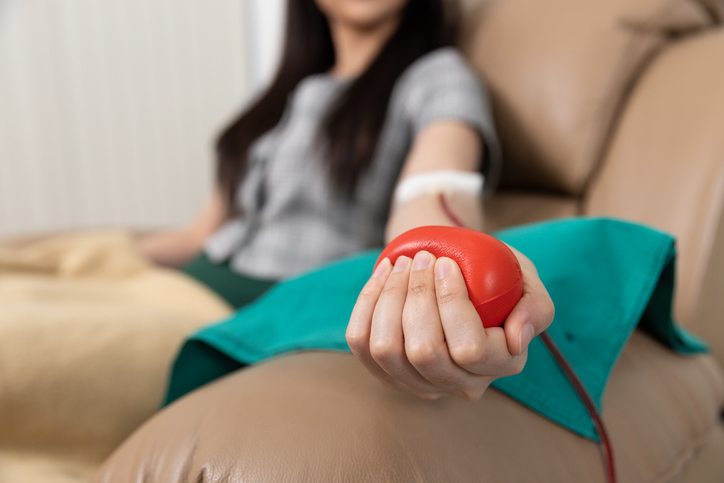
Think of your body’s circulatory system like the pipes in a house. Just as pipes carry water to different rooms, your arteries and veins bring important oxygen and nutrients to your organs and tissues and then back to the heart. When something goes wrong—like a blockage or damage—it can lead to serious health problems such as a stroke, heart attack, bleeding or vein damage.
Marta Sheremeta, MD, a vascular surgeon at Summit Health, offers advice on ways to keep your blood vessels healthy. She explains what a vascular lab is, how the tests that are available can help detect vascular problems and break down the variety of treatment options at Summit Health.
“The highly specialized team at our vascular lab is committed to excellence in vascular testing and imaging,” says Dr. Sheremeta. “We are proud that the vascular lab located at the Berkeley Heights, NJ, campus is one of only 105 vascular ultrasound labs in the United States that have maintained certification with the Intersocietal Accreditation Commissions for the past 30 years.”
Common vascular conditions and symptoms
Several conditions can affect your blood vessels, and it is important to recognize their symptoms:
- Carotid artery disease: This affects the arteries that supply blood to your brain. Symptoms might include sudden slurred speech, trouble moving your arm or leg or facial droop. These symptoms can be signs of a stroke or a transient ischemic attack (TIA).
- Peripheral arterial disease: This condition causes pain in your legs when you walk and can lead to foot sores or gangrene (serious infection).
- Renal artery stenosis: This is a blockage in the artery leading to your kidneys and can cause high blood pressure that is hard to control.
- Abdominal aortic aneurysms: This involves a ballooning in the main artery of your body. It often does not show symptoms until it is too late, leading to severe pain and possibly death. Smokers over sixty-five should get a one-time ultrasound to check for this condition.
- Varicose veins and edema: This causes swelling and throbbing pain in your legs, especially if you stand or sit for extended periods. Symptoms often improve with elevation and compression.
- Most conditions do not have any symptoms until a critical moment. For example, a stroke can be the first symptom of a blockage of carotid artery, or a fatal bleeding can be the first symptom of an abdominal aortic aneurysm, even though the condition was present and unrecognized for years.
Death or prolonged complications of stroke, aneurysm rupture, amputations are preventable, if recognized and treated properly. That’s why it is very important for the patient with risk factors to be properly evaluated and monitored.
Who is at risk?
Certain factors can increase your risk of developing vascular conditions:
- Smoking
- High blood pressure
- High cholesterol
- Heart disease
- Family history of vascular issues
- Kidney disease
Women who have had multiple pregnancies or those who sit or stand for extended periods are also at higher risk for varicose veins.
How to get checked at the Summit Health Vascular Lab
Dr. Sheremeta says, “If you have concerns, call our office to see a vascular surgeon. We are available almost every day of the week. The surgeon will check you, discuss the nature of your condition and may order tests. Afterward, they will make a personalized plan and talk about any changes to your medications, lifestyle modification, monitoring and treatment options and associated risks.”
At Summit Health’s Vascular Lab, we offer a variety of tests to evaluate your vascular health:
- Deep venous thrombosis (DVT) tests: To check for blood clots in the legs.
- Venous insufficiency studies: To see if your veins are working properly.
- Carotid artery ultrasounds: To check for blockages in the arteries leading to your brain, which is one of the most common cause of stroke
- Abdominal aortic aneurysm studies: To assess the main artery in your abdomen.
- Renal artery studies: To look at the arteries leading to your kidneys.
- Arterial studies: To measure blood flow in your legs and arms and check for blockages.
What do vascular surgeons do?
Vascular surgeons are experts in treating diseases of the arteries and veins, using both traditional surgeries and modern, minimally invasive techniques.
How are vascular surgeons different from cardiologists?
Cardiologists are experts in heart conditions, while vascular surgeons specialize exclusively in the arteries and veins. Both types of doctors undergo extensive training in their respective fields while other specialties can perform minimally invasive procedures vascular surgeons are the only ones with the ability to offer the most comprehensive panel of treatment options, ranging from most cutting edge minimally invasive procedures to big open operations best tailored to each patient’s needs.
Advanced treatment options for vascular conditions
Vascular surgery is one of the most technologically advanced fields of medicine. Now we have the ability to treat some of the most complex conditions which in 2000 would require a prolong hospital stay with minimally invasive treatments, ¼ inch incision and often allowing patients to return home the next day.
How Summit Health can help
At Summit Health, our Vascular Surgery team provides top-quality care from diagnosis through treatment. You can expect the latest state of the art treatments and personalized attention from our experienced surgeons.
Find a specialist at Summit Health today for tailored, comprehensive care. Schedule an appointment and let us guide you to better vascular health.
